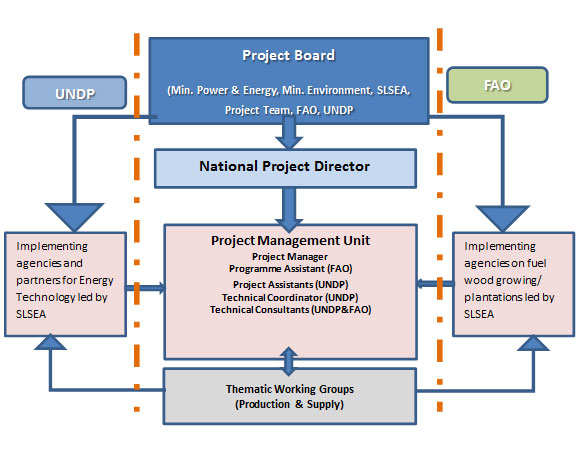Sri Lanka imports most of its energy requirement in the form of oil or coal. This accounts for 60% of electrical energy, all transportation fuel, and a minor portion of industrial and cooking fuel. About 10% of the petroleum fuels (coal, fuel oils and gas) amounting to 350,000 to 400,000 tonnes per annum, presently imported onto this country, is utilized by the industrial sector to generate process heat. Consumption level of furnace oil in 2007 was 186,210 tonnes.
Industrial thermal energy can be regarded as one of the major thrust areas for fuel switching (from fossil fuels to fuel wood or other biomass) as it offers the best economic justification. Another reason for selecting this sector is recent technological devel¬opments related to conversion technology (such as gasification, efficient boilers) and improved energy crop production (with the Government declaring the fuel wood species Gliricidia as an important plantation crop). These developments have made it possible to produce bio-energy at lower cost and with higher conversion efficiencies, which could make it competitive with other commercialized fuels. This has been confirmed during the analysis performed consultants and stakeholder consultations in the project preparatory phase.
Due to constant price escalations and the gradual withdrawal of the government subsidy for fossil fuel, fuel wood demand in industry has seen a steady increase. Even larger industries, traditionally reliant on furnace oil, diesel or LPG are planning to convert their processes to use wood.
The goal of the project is to reduce greenhouse gas emissions from the use of fossil fuel for thermal energy generation in the Sri Lanka industrial sector. The goal will be reached by means of removing barriers to the realization of sustainable biomass plantation, increase of market share of biomass energy generation mix and adoption of biomass-based energy technologies in Sri Lanka. The project consists of the following components: (1) Policy-institutional support for effective implementation; (2) Barrier removal for sustainable fuel wood production; (3) Enabling environment for fuel wood suppliers; (4) Wood-based energy technology development. The project is expected to generate global benefits in directly avoided greenhouse gas (GHG) emissions of almost 203 kilotons of CO2 due to switching from fossil fuels to wood-based technologies (over the lifetime of 10 years) and almost 609 – 1,378 ktCO2 as indirect emission reduction impact.
The project seeks to work with private sector, especially small-scale rural entrepreneurs to improve availability of wood-based fuel wood pieces, chips, briquette etc. at a reasonable price, of requisite quality and regular supply for industrial use. Further, the project aims to improve technology; and operations and maintenance related services for industries to switch from fossil fuel to fuel wood. Improvement of wood-burning thermal boilers and small gasification units is envisaged; with added technological solutions for fuel wood collection, its handling, storage and transport.
The project is jointly managed by UNDP and FAO as UN agencies with the reporting requirements to the GEF. The Project is Implementing under the Sri Lanka Sustainable Energy Authority of the Ministry of Power and Renewable Energy.
The project is implementing by the Sri Lanka Sustainable Energy Authority of the Ministry to the Ministry of Power & Energy (MoP&RE). The SLSEA will coordinate fuel wood plantation, supply and end-use components of the project. The fuel wood growing component and other land use options should be looked into in cooperation with the Forest Department. Also broad-base project implementation will seeks the support of Chambers’, non-governmental and private sector consortium and professional bodies for project implementation activities. The following figure illustrates the new project implementation and management arrangement.
